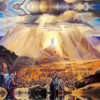If you remember the twin rivers metaphor, periodically the animal consciousness and the thinking consciousness make contact with each other. Like the separate chains in a DNA helix they normally stay apart, but when the right circumstances are present and when the right stimuli occurs, they both crash together with a simultaneous recognition and whatever it is we are experiencing seems especially meaningful.
Revelation is crossing the streams!
What makes the experience of revelation occur more often or less often is the one thing both streams have in common. Attention. Attention works like a switch in the mind and is responsible for assembling recognition.
So, potentially, perhaps, a “revelation” could happen any time. Indeed, anytime anywhere. The Buddhist concept of samadhi, or satori, sudden insight or enlightenment.
Now for most people these moments do occur but are gone often almost as quickly as they occurred. They aren’t really processed or assimilated into how we think, so in a sense, we don’t learn anything from them. But this loss isn’t necessary. Many, if not most people, have a conscious mental habit that defeats learning from revelation.
I have had two or three profound revelations in my entire life and they are unforgettable. Then you are certainly richer for them.
What is that conscious mental habit that sabotages this? Trying to break it apart and analyze it? Actually no, though that will also make it hard to learn from if it’s your first response. That can happen after you first really capture the experience.
Trying to make it into “ordinary” experience? You have it exactly. How often do we have subtle little reactions to people we see or things we experience? Something like, “That person irritates me, but I don’t know why.”?
Often. That conscious recognition is a gateway, but what do we most often do with those experiences?
Ignore it. Yes, and for a whole slew of reasons. It’s really inconvenient to have those moments isn’t it?
Yes, distracting for one. That second part, “That person irritates me, but I don’t know why” is the slamming door.
It’s vexing.
We can recognize those moments as being legitimate perception. Do we say, “I saw my feet, but did I really see my feet.”?
We have a sense for our environment, environmental order. It’s an instinct, and actually more primal, more foundational than even vision.
The blind still have the sense I am speaking of, and in fact for them it often gets even sharper. They can’t be hypnotized by the dance of visual motion. They know they have to pay close attention to their environmental awareness. This is why they often believed the blind could have visions, even foresee the future. That awareness is where they got their information from. They could see changes of weather coming, because they weren’t hypnotized by any one sense.
Or perhaps an earthquake? Yes, earthquakes, plagues, even war.
I ponder prophets. Prophets are just environmental neurons.
This reminds me of zen meditation practice. 4 am. Get to Hongwanji, sit in front of wall, very little sensory input, and then be taught by sensei how to maintain the focus this way. This goes on for hours into the sunrise and it does sharpen things up quite a bit.
So, what seems to be narrowing the focus is actually expanding it. Yes, exactly. If you open your mind to those moments, they colour everything else you perceive in that moment. If you make a habit of focusing your attention on these moments, you more or less stop living in either world, and instead experience something that goes beyond either of them.
Your thoughts are welcome. Be well friends.
Travis Saunders
Dragon Intuitive
~science,mysticism,spirituality~



Leave a Reply